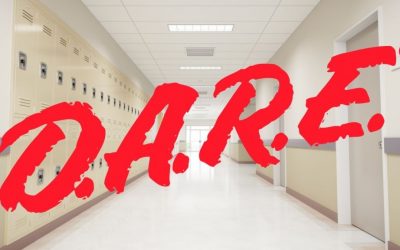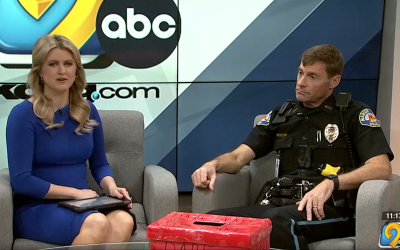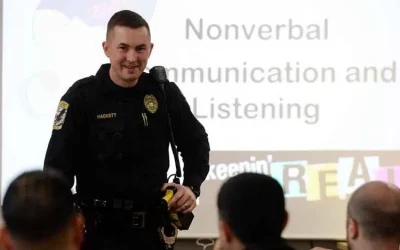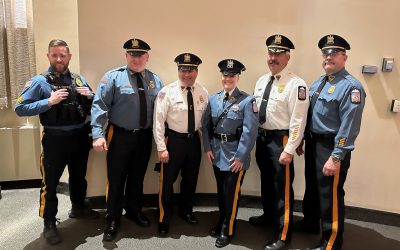By Ashley M. Frazier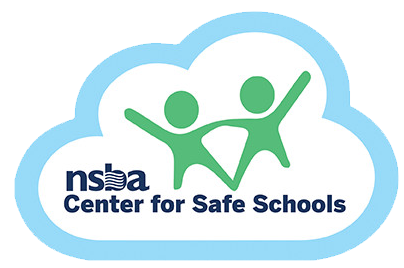
There is an opportunity for law enforcement and schools to partner in a way that elevates both institutions and is potentially transformative in building trust and cooperation between community members.
If school communities decide that having law enforcement on site is right for their children, then they must select school resource officers (SROs) carefully and ensure that they are rigorously prepared., They should be socialized into the school culture, as a member of the educational team, in the same way as other staff members. Just as classroom teachers, special educators, school counselors, and occupational and speech therapists come from different disciplinary training programs and coalesce into collaborative teams that forge a shared vocabulary and best practices for their unique context, SROs need to be deeply included to be effective in their positions.
SRO responsibilities should be driven by the social-emotional lives of students, focused on supporting children and adolescents in developing skills in problem-solving, decision making, goal setting, resilience, and emotional regulation. SROs should engage, affirm, and nurture students, acting as a teacher and guide, and not in a disciplinary capacity. The nature of their law enforcement training means the SRO is uniquely prepared to plan for and maintain student safety in the face of external threats. An effective SRO also will recognize that the most effective way to protect students is to prepare them to assess and manage their own bodies and lives successfully.
The D.A.R.E. program was established in 1983. It is motivated by a vision in which students are empowered to respect others and to lead lives free from violence, substance abuse, and other dangerous behaviors. Thousands of certified officer-instructors in tens of thousands of classrooms throughout the U.S. and around the world implement the D.A.R.E. curricula to teach students good decision-making skills to help them lead safe and healthy lives.
While many D.A.R.E. officers are SROs, and many SROs are D.A.R.E. officers, they are each a distinct position from the other. There is significant overlap in the selection, competencies, and training needed to succeed in either role. In that spirit, we offer some of the strategies that have helped D.A.R.E. officers successfully partner with schools for over 35 years.
Clearly defined role
The role of the SRO must be clearly defined in a contract between the school and law enforcement agency so that everyone is on the same page about what the officer is trained and expected to do in the school. This should be determined by schools and their communities, informed by district and state guidance and national organizations.
The role of an SRO includes functions such as teacher, mentor/guide, and law enforcement. While the law enforcement role will be most familiar to the officer and others, it is also the one that has drawn the most concern from the public. This role requires clear communication about how it will be realized on the school campus. It is important that the distinction between enforcing laws and enforcing school rules in a disciplinary role is apparent to both school and law enforcement personnel.
The teacher and mentor/guide roles may be less familiar and require training, however they are full of potential. A well-implemented SRO program can provide opportunities to build positive, healing relationships among law enforcement and the young people, families, and school personnel. Each gets to see and know the other in a routine, supportive environment. The lines of communication that can prevent an adverse health, safety, or security event are developed over time when students and law enforcement officers are in contact often enough to form a trusting relationship that encourages safe and timely sharing of information.
The SRO should be included as a full member of the educational team. There are many “all hands on deck” opportunities during the school year. The SRO belongs there with everyone else, on the duty chart, at staff assemblies, team-building activities, and meetings. They should attend in-service training and professional development, pitching in with school events and projects. It may be appropriate to include the SRO in IEP/BIP conferencing.
Additionally, there should be a clear expectation that the SRO will engage and interact with students throughout the school day in multiple contexts. These may include informal morning or afternoon greetings, casual conversation in the cafeteria or recreational space, and more formal classroom visits to lead discussion and activities about relevant health and safety topics. The mentorship and guidance role can only come to life through consistent positive contact.
A rigorous process must be in place for recruiting and selecting qualified and appropriate SRO candidates who are good fits for the school culture and climate, and who are well-suited for the specific role that the school community has defined for the SRO.
Comprehensive and continual training
SRO training must be robust, comprehensive, and ongoing, preparing officers for the range of knowledge they will need to effectively meet the expectations of their school community. In preparing for the SRO role, officers should learn about child development, including specialized training in the development and education of students with disabilities. They should learn classroom management skills, positive behavioral intervention, conflict de-escalation, restorative practices, and culturally responsive education. Training should include information about student rights and the responsibilities of educational institutions.
An SRO should receive the same onboarding and professional development that other school personnel receive to familiarize them with the policies, procedures, and processes of their school community. They should have intimate knowledge of their school’s approach to promoting safe and pro-social behavior, as well as accommodations, plans, and strategies that are used to individualize approaches to specific cases and contexts.
Beyond these basic knowledge and skills required for the SRO to function competently in a school setting, they should develop specific areas of expertise as a resource to the school community. To perform exceptionally in their work, the SRO should know about effective health promotion and prevention science. Many SROs deliver school programming related to life skills, decision making, and safety. Effective prevention is an ongoing, multi-level, skills-building effort, and certification in comprehensive programming such as D.A.R.E. can provide the SRO with a high level of proficiency and a library of evidence-informed curricular materials that will allow a customized approach suitable to the needs of their community.
Law enforcement officers are professional crisis responders. They can provide leadership in times of crisis, and in preparing school safety and security plans. While they should be chosen for their potential to enhance a school community, robust and ongoing training is critical, and only by participating as a full member of the educational team will they ultimately succeed.
Ashley M. Frazier is the director of curriculum and training at D.A.R.E. America
This article was featured in the National School Board Association’s Center for Safe Schools January 2021 newsletter.
Here’s what D.A.R.E. is teaching kids about weed
Aside from living through the first iteration of social media and being the final group to understand what an internet dial tone sound is, Millennials were also the first full generation to go through the classic Drug Abuse Resistance Education (D.A.R.E.) program....
Marion police officer talks about D.A.R.E. classes
From KCRG.com: Marion Police Officer Tom Daubs joins KCRG to talk about D.A.R.E. classes
Key Addiction Points You Need to Know
Substance use disorder (SUD) is the nation’s most pressing public health challenge, and the most urgent SUD in 2024 is opioid abuse and dependency. According to the CDC, more than one million people have died since 1999 from drug overdose…
Old Lyme Officer Revives D.A.R.E. Program After Two Decades Hiatus
Officer Stephen Hackett of the Old Lyme Police Department is set to become the town’s first Drug Abuse Resistance Education (D.A.R.E.) instructor in over two decades. With a new focus on skill-building, the updated D.A.R.E. program aims to empower the town’s youth to make responsible choices.
Mental Health Stigma: Life or Death
The pervasive stigma against people with addictions, particularly opioid use disorder (OUD), is a major problem requiring urgent attention in the United States. Stigma is likely at least part of the reason why only 1 in 5 individuals with opioid dependence receives…
Former YAB Member and D.A.R.E. Scholarship Awardee Julia Manning is now a Police Officer for the Park Ridge Police Department
Julia Manning was an active member of the YAB (Youth Advisory Board) from 2016 to 2019, and she is now proud to be an alumni of the program. In recognition of her outstanding achievements, she was honored with the prestigious 2019 D.A.R.E. America Louis 'Skip' Miller...
150-Plus Students Graduate Russell D.A.R.E. Program
Russell Elementary students graduated from the D.A.R.E. program at Russell-McDowell Intermediate School on Monday. About 153 fifth-grade students — all wearing white shirts that read “keep kids off drugs” — filled the gymnasium early afternoon Monday to be recognized...
Students Graduate from D.A.R.E. Program at Mary Queen of Peace
Four classes at Mary Queen of Peace in Mount Pearl have graduated from the RNC’s Drug Abuse Resistance Education program. The ten-week series of classroom lessons, led by an RNC officer to grade six students, teaches children how to live productive drug-free and...
Hundreds of Students Graduate from MPD’s D.A.R.E. Program
MEMPHIS, Tenn. — Memphis Police celebrated with hundreds of local students as they graduated from the D.A.R.E. program Wednesday. For 40 years, D.A.R.E. has been teaching children about the dangers of high-risk situations with alcohol, drugs, and bullying. MPD…
Copyright © 2022 D.A.R.E. America. All Rights Reserved.
Copyright © 2022 D.A.R.E. America.
All Rights Reserved.

